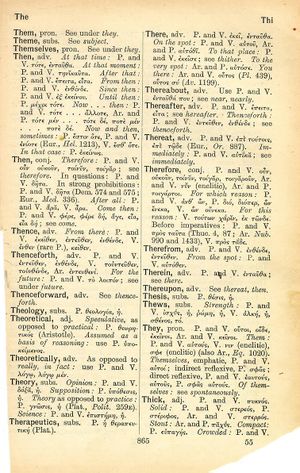then
Ἰσχυρότερον δέ γ' οὐδέν ἐστι τοῦ λόγου → Oratione nulla vis superior → Nichts ist gewiss gewaltiger als die Vernunft | Nichts ist gewiss gewalt'ger als der Rede Kraft
English > Greek (Woodhouse)
adv.
At that time: P. and V. τότε, ἐνταῦθα.
At that moment: P. and V. τηνικαῦτα.
After that: P. and V. ἔπειτα, εἶτα.
From then: P. and V. ἐνθένδε.
Since then: P. and V. ἐξ ἐκείνου.
Now… . then: P. and V. τότε... ἄλλοτε, Ar. and P. τότε μέν... τότε δέ, ποτὲ μέν... ποτὲ δέ.
Now and then, sometimes: P. ἔστιν ὅτε, P. and V. ἐνίοτε (Eur., Hel. 1213), V. ἔσθʼ ὅτε.
In that case: P. ἐκείνως.
conj.
Therefore: P. and V. οὖν, οὐκοῦν, τοίνυν, τοίγαρ; see therefore.
In questions: P. and V. δῆτα.
In strong prohibitions: P. and V. δῆτα (Dem. 574 and 575; Eur., Med. 336).
After all: P. and V. ἄρα, V. ἆρα.
Come then: P. and V. φέρε, φέρε δή, ἄγε, εἶα, εἶα δή; see come.

